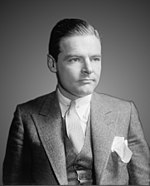Henry Cabot Lodge Jr., Date of Birth, Place of Birth, Date of Death
TweetHenry Cabot Lodge Jr.
American politician
 Date of Birth: 05-Jul-1902
Date of Birth: 05-Jul-1902
 Place of Birth: Nahant, Massachusetts, United States
Place of Birth: Nahant, Massachusetts, United States
Date of Death: 27-Feb-1985
Profession: politician, diplomat, journalist
Nationality: United States
Zodiac Sign: Cancer 
About Henry Cabot Lodge Jr.
- Henry Cabot Lodge Jr.
- (July 5, 1902 – February 27, 1985), sometimes referred to as Henry Cabot Lodge II, was a Republican United States Senator from Massachusetts and a United States ambassador.
- He was the Republican nominee for Vice President in the 1960 presidential election alongside incumbent Vice President Richard Nixon.
- The Republican ticket lost to Democrats John F.
- Kennedy and Lyndon B.
- Johnson. Born in Nahant, Massachusetts, Lodge was the grandson of Senator Henry Cabot Lodge and the great-grandson of Secretary of State Frederick Theodore Frelinghuysen.
- After graduating from Harvard University, Lodge won election to the Massachusetts House of Representatives.
- He defeated Democratic Governor James Michael Curley in 1936 to represent Massachusetts in the United States Senate.
- He resigned from the Senate in 1944 to serve in Italy and France during World War II.
- Lodge remained in the Army Reserve after the war and eventually rose to the rank of major general.
- In 1946, Lodge defeated incumbent Democratic Senator David I.
- Walsh to return to the Senate. He led the Draft Eisenhower movement before the 1952 election and served as Eisenhower's campaign manager, ensuring that his candidate triumphed at the 1952 Republican National Convention.
- Eisenhower defeated Democratic nominee Adlai Stevenson II in the general election, but Lodge lost his own re-election campaign to John F.
- Kennedy.
- Lodge was named as ambassador to the United Nations in 1953 and became a member of Eisenhower's Cabinet.
- Vice President Richard M.
- Nixon chose Lodge as his running mate in the 1960 presidential election, but the Republican ticket lost the election. In 1963, President Kennedy appointed Lodge to the position of Ambassador to South Vietnam, where Lodge supported the 1963 South Vietnamese coup.
- He continued to represent the United States in various countries under President Lyndon B.
- Johnson, President Nixon, and President Gerald Ford.
- Lodge led the U.S.
- delegation that signed the Paris Peace Accords with North Vietnam, leading to the end of the Vietnam War.
- He died in Beverly, Massachusetts in 1985.
Read more at Wikipedia
See Also
- Famous People's Birthdays on 05 July, United States
- Famous People's Birthdays in July, United States
- Famous politician's Birthdays on 05 July, United States
- Famous politician's Birthdays in July, United States
- Famous diplomat's Birthdays on 05 July, United States
- Famous diplomat's Birthdays in July, United States
- Famous journalist's Birthdays on 05 July, United States
- Famous journalist's Birthdays in July, United States


